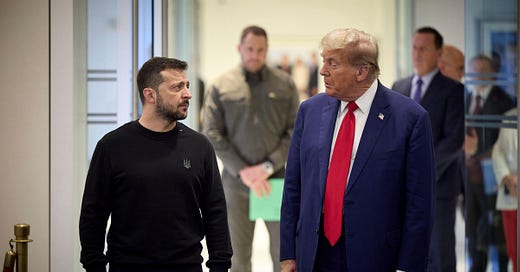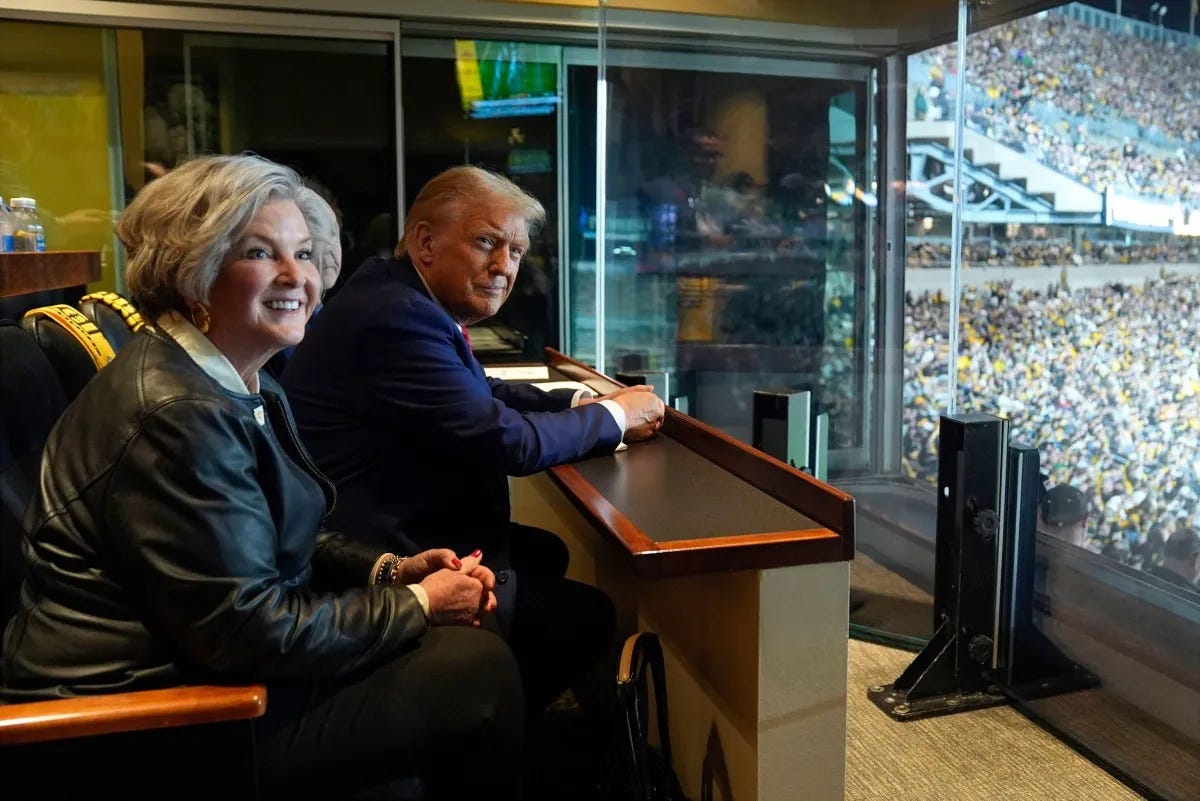Vladimir Putin knows his audience. In his message of congratulation, the Russian leader appealed to Trump’s ego by hailing him as “courageous”, for his defiant reaction to July’s assassination attempt. He also offered an informal congratulations to the President-elect for his victorious campaign and opened the door to “discussions” in the future.
Puffery aside, Putin declined to make a formal congratulatory call and had his spokesperson issue a statement that the US “is an unfriendly country that is both directly and indirectly involved in the war against our state”.
Despite their relatively amicable relationship in Trump’s first term, Putin appears to be posturing somewhere between hostility and macho-flattery.
Meanwhile, Zelensky seized the opportunity to curry favour with Trump, extending one of the first congratulatory calls to 47. In his message, Zelensky lauded Trump’s “impressive victory” and expressed his appreciation for the President-elect's commitment to the “peace through strength approach”.
Zelensky also emphasised their discussion of his “victory plan”, a maximalist blueprint to reestablish Ukraine’s internationally-recognised borders. The Zelensky approach has little in common with the “peace” machinations presented by Trump and his VP J.D Vance thus far. Rather than supporting Ukraine until victory, the incoming administration has continually hinted at its ambition to end aid and facilitate Ukrainian concession.
Despite Trump’s past jabs at the Ukrainian President, now is no time to quarrel. Zelensky has to quickly forge inroads with Trump if he is going to prevent a hasty “day one” negotiation which compromises the crucial US weapons supply and Ukrainian sovereignty. As Tim Marshall points out, much of this will come down to who Trump selects for the top defence role - the decision between Ukraine-advocate Mike Pompeo or China-hawk Elbridge Colby could make all the difference.
The EU’s top brass have been gathered today at a summit in Budapest to discuss this potentially cataclysmic shift, along with the various other implications of a Trump return. Welcoming Zelensky to the community forum, Meloni, Macron, and the faltering Scholz all affirmed their support for the Ukrainian cause in the wake of Trump’s election and reiterated calls for European strategic autonomy.
Their distress over Trump’s triumph was not shared by the lone MAGA aficionado amongst the group, Viktor Orban. The Hungarian PM revelled in Trump’s victory, attesting that he had opened vodka bottles to celebrate “this fanastic result”. At the summit today, Orban confidently asserted that Trump will “quit the Ukraine war”, which will force Brussels to rethink its support as well.
Although the EU and the UK have massively increased their contributions to Ukraine, militarily and financially, many analysts and top officials believe that the loss of American support would end any prospect of Ukrainian victory. The solidarity rhetoric expressed by Europe’s leaders in Budapest right now could soon prove impotent if Trump does decide to abandon the fight.
Trump cabinet speculation aside, serious questions remain over Putin’s desire for negotiation. As it stands, Russia has the upper hand on the battlefield, inching forward in Ukraine’s east every day. In addition, their economy has prevailed over western sanctions and Moscow’s wartime supply chains have proven resilient.
While Trump may boast of ending the conflict on day one, it’s uncertain that Putin will even want to race to the war’s cessation. Trump may be the man of the hour, but Putin has time on his side.
Josh Schlicht
Reaction Reporter
ALSO ON REACTION
Tim Marshall
Trump 2.0’s top team may not be interested in restraining him
Neil Collins
Thames Water: drowning in debt? Have some more
Jenny Hjul
Facing up to four more years of Trump
ALSO ON REACTION
Looney Tunes Democrats in shock as The Donald wins bigly Gerald Warner
Election aftermath: where is the introspection? Patrick Barrow
Assad is caught between Iraq and a hard place as Israel ratchets up its attacks on Syria Josh Schlicht
Rich Romanian opera heritage should be more widely shared Gerald Malone
Word Watch: Into Andrew Wilton
ALSO KNOW
Amsterdam riots: "We cannot turn a blind eye to antisemitic behaviour on our streets", said Dutch King Willem-Alexander, after a night of rioting targeted Israeli football fans in the centre of Amsterdam. At least 62 arrests were made today following violence in the Dutch capital that left 5 people in hospital. The clashes occurred after a football match between Dutch team Ajax Amsterdam and Israeli outfit Maccabi Tel Aviv. The Mayor of Amsterdam Femke Halsema called the attacks a “hit and run” where “men on scooters crisscrossed the city looking for Israeli football fans”; Geert Wilders described the event as a “pogrom” tweeting that “Muslims with Palestinian flags were hunting down Jews”. An Amsterdam police spokesperson stated that incidents occurred on “both sides” with Maccabi fans setting a Palestinian flag on fire and chanting “Finish the Arabs”. Israeli Prime Minister Benjamin Netanyahu condemned the attack and sent rescue planes to Amsterdam.
Starmer appoints Tony Blair’s former Chief of Staff as National Security Adviser: Jonathan Powell has been appointed the UK’s new National Security Adviser, replacing Sir Tim Barrow, who held the role since September 2022. A Tory spokesperson condemned this move, stating, "It is disappointing the government have appointed another Labour apparatchik to a senior role.”
Team Trump: Donald Trump announced the appointment of his campaign manager, Susan Wiles, as his new Chief of Staff, the first ever female White House chief of staff. This appointment comes amid speculation regarding the makeup of Trump’s next cabinet, with Mike Pompeo, Robert Kennedy Jr, and Elon Musk all being touted as potential administrative picks. The Republican Party looks set to win a majority of seats in the House of Representatives, adding to its Senate majority.
UN report on Gaza deaths : The UN’s Human Rights Office released a new report today in which it said its analysis shows close to 70 per cent of verified deaths over a six-month period in Gaza are women and children. The ages most represented among the dead were five to nine-year-olds. The report added that the level of international law violations during the conflict was “unprecedented”.
FIVE THINGS
Curated by the Reaction Team - Dorian Bovay
Britain is rethinking its approach to China, writes Isabel Hilton in Prospect
Katie Glueck in The New York Times on Trump's strange bedfellows: Arab Americans and Right-Leaning Jews
"We have won": Russians envision a new global system with Trump victory, report Francesca Ebel and Catherine Belton in The Washington Post
How did it go so wrong for Germany? asks Wolfgang Münchau in the New Statesman
Germany's abortion debate is still shaped by its east-west divide, writes Gouri Sharma in New Lines Magazine
REACTION is a reader-supported publication. To receive new posts and support my work, consider becoming a free or paid subscriber.








